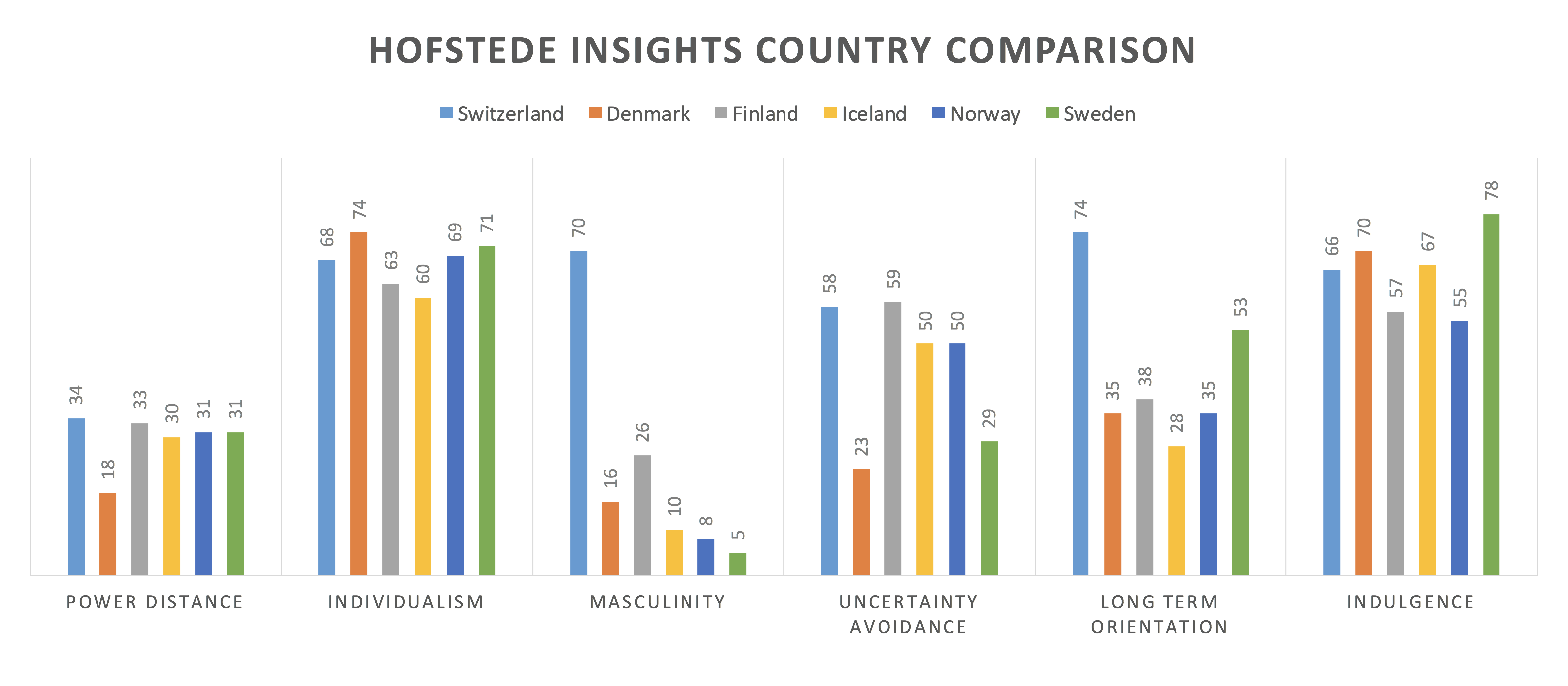Culture and Workplace Values in Switzerland and the Nordics
The Hofstede model for national culture offers a comprehensive study of how values in the workplace are influenced by culture. The model, which is based on extensive research, defines culture as “the collective programming of the mind distinguishing the members of one group or category of people from others” and consists of six dimensions (see table).
On their website, Hofstede Insights offers a free Country Comparison tool that provides a high-level analysis per country. Based on the analysis provided by this tool, we have summarised below the main similarities and differences in business culture between Switzerland and the five Nordic countries – Denmark, Finland, Iceland, Norway and Sweden.
MAIN SIMILARITIES
Egalitarian mindset
Overall Switzerland comes out as an egalitarian society with low power distance although there is a vast difference between the German and French speaking parts of Switzerland. Similar to France, people in the French part of Switzerland has a higher acceptance of organisational hierarchy, which is seen as reflecting inherent inequalities and needs no further justification. Centralisation is popular, subordinates expect to be told what to do, and the ideal boss is a benevolent autocrat. Challenges to the leadership are not well-received.
The German part of Switzerland, however, shows similar preferences to the Nordic countries, characterised by independence and equal rights. Hierarchy is for convenience only, superiors are accessible and management facilitates and empowers. Power is decentralised, employees expect to be consulted and managers count on the experience of their team members. Control is disliked and the attitude towards managers are informal and on first name basis. Communication is direct, participative and consensus-orientated. Denmark even ranks highest amongst the EU27 countries in terms of employee autonomy.
Individualism
Both German and French speaking Switzerland as well as the Nordic countries score high as individualist societies. This means that there is a high preference for a loosely-knit social framework in which individuals are expected to take care of themselves and their immediate families only. The employer/employee relationship is a contract based on mutual advantage, and hiring and promotion decisions are supposed to be based on merit only. Nepotism is not encouraged.
Management is the management of individuals. The “Self” is important, and individual, personal opinions are valued and expressed. Offence causes guilt and a loss of self-esteem. Communication is explicit and small talk is kept at a minimum. The right to privacy is important and respected and there are clear lines between work and private life. Job mobility is higher and people think in terms of individual careers.
Indulgence
Both Switzerland and the Nordic countries indicate a tendency towards indulgence, meaning that people generally exhibit the willingness to realise their impulses and desires with regard to enjoying life and having fun. They possess a positive attitude and have a tendency towards optimism. In addition, they place a higher degree of importance on leisure time, act as they please and spend money as they wish.
MAIN DIFFERENCES
Masculine vs. Feminine Values
Both the German and the French speaking parts of Switzerland score high as masculine societies, although the impact is much more noticeable in the German part.
Switzerland is therefore a society driven by competition, achievement and success, with success being defined as the winner or the best in field – a value system that starts in school and continues throughout organisational life. People in masculine countries “live in order to work.” Managers are expected to be decisive, and the emphasis is on equity, competition and performance. Conflicts are resolved by fighting them out.
On the other hand, all the Nordic countries are typical feminine cultures, with Norway and Sweden even being considered the most feminine societies in the world. In these countries, work/life balance is important and quality of life is a sign of success. People “work in order to live” and incentives such as free time and flexible work hours/place are favoured.
An effective manager is supportive to his/her people, and decision making is achieved through involvement. Managers strive for consensus and people value equality, solidarity and quality in their working lives. Conflicts are resolved by compromise and negotiation, and the Nordic countries are known for their long discussions until consensus has been reached.
Societal solidarity, sympathy for the underdog and making sure all are included is also important in feminine societies. Status is not shown and standing out from the crowd or trying to be better than others is neither socially nor materially rewarded. This behaviour is enforced by the so-called “Jante Law” – a fictional law and a Scandinavian concept which counsels people not to boast or try to lift themselves above others.
Long-Term vs. Short-Term Orientation
With a high score on long-term orientation, the Swiss culture is definitely pragmatic. People believe that truth depends very much on situation, context and time. They show an ability to adapt traditions easily to changed conditions and there is a strong propensity to save and invest. They also encourage thrift and efforts in modern education as a way to prepare for the future.
While Sweden does not express a clear preference within this dimension, all the remaining Nordic cultures come out as more short-term oriented. People in such societies are normative in their thinking and have a strong concern with establishing the absolute Truth. They prefer to maintain time-honoured norms and traditions while viewing societal change with suspicion. There is a relatively small propensity to save for the future, and a focus on achieving quick results.
Scattered attitudes towards uncertainty
When it comes to attitudes towards uncertainty, there are not only big differences between the various Nordic countries but also variations between the French and German speaking parts of Switzerland. While the French part shows a strong preference for avoiding uncertainty, this preference is less pronounced in the German part.
Overall Switzerland shows a preference for avoiding uncertainty and the same is true for Finland. Societies that are less comfortable with uncertainty tend to maintain rigid codes of belief and behaviour and be more intolerant of unorthodox behaviour and ideas. In these cultures there is an emotional need for rules (even if the rules never seem to work). Time is money, precision and punctuality are the norm, and people have an inner urge to be busy and work hard. Security is an important element in individual motivation, and innovation may be resisted. Decisions are taken after careful analysis of all available information.
With a medium score, both Norway and Iceland shows neutral preferences with regards to uncertainty. This means that both generalists and experts are needed. There is a focus on planning, but these plans can be altered at short notice and improvisations made. Emotions are not shown much in these societies. People are fairly relaxed and not averse to taking risks. Consequently, there is a larger degree of acceptance for new ideas and innovative products, and there is a willingness to try something new or different, whether it pertains to technology, business practices, or food.
Clearly more comfortable with uncertainty and ambiguity are the people in Denmark and Sweden. They do not need a lot of structure and predictability and plans that change overnight are a natural part of their work life. Schedules are flexible and precision and punctuality do not come naturally. Hard work is undertaken when necessary but not for its own sake. Practice counts more than principles in these societies. People believe there should be no more rules than necessary, and if they are ambiguous or do not work they should be abandoned or changed.
Curiosity is natural and encouraged from a very young age. This combination of being highly individualist and curious nations is also a driving force for innovation and design. There is heavy consumerism for new and innovative products, and the fast and highly creative industries, like advertising, marketing and financial engineering thrive.
CONCLUSION
The Hofstede Country Comparison analysis offers a good basic insight into the main cultural differences between Switzerland and the Nordic countries as well as certain differences that exist within these two regions.
While it remains rather general and does not capture potential industry differences, it can be a useful starting point for anyone who would like to get a better understanding of how national culture impacts workplace values and behaviours in these countries.
Six dimensions of National Culture
1. Power Distance
People in societies exhibiting a large degree of Power Distance accept a hierarchical order in which everybody has a place and which needs no further justification.
In societies with low Power Distance, people strive to equalise the distribution of power and demand justification for inequalities of power.
2. Individualism vs. Collectivism
Individualism represents a preference for a loosely-knit social framework in which individuals are expected to take care of only themselves and their immediate families.
Collectivism represents a preference for a tightly-knit framework in society in which individuals can expect their relatives or members of a particular group to look after them in exchange for unquestioning loyalty.
3. Masculinity vs. Femininity
Masculinity represents a preference for achievement, heroism, assertiveness, and material rewards for success. Society at large is more competitive.
Femininity represents a preference for cooperation, modesty, caring for the weak and quality of life. Society at large is more consensus-oriented.
4. Uncertainty Avoidance
Societies that feel uncomfortable with uncertainty and ambiguity maintain rigid codes of belief and behaviour, and be intolerant of unorthodox behaviour and ideas.
Societies that feel more comfortable with uncertainty and ambiguity maintain a more relaxed attitude in which practice counts more than principles.
5. Long Term vs. Short Term Orientation
Societies who show a normative or short-term approach prefer to maintain time-honoured traditions and norms while viewing societal change with suspicion.
Societies with a more pragmatic or long-term approach encourage thrift and efforts in modern education as a way to prepare for the future.
6. Indulgence vs. Restraint
Indulgence stands for a society that allows relatively free gratification of basic and natural human drives related to enjoying life and having fun.
Restraint stands for a society that suppresses gratification of needs and regulates it by means of strict social norms.

